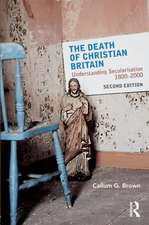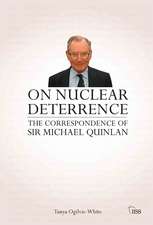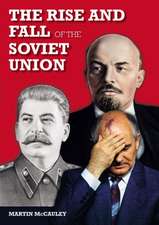The Origins of the Russian Civil War: Origins Of Modern Wars
Autor Geoffrey Swainen Limba Engleză Paperback – 11 oct 1995
| Toate formatele și edițiile | Preț | Express |
|---|---|---|
| Paperback (1) | 433.30 lei 6-8 săpt. | |
| Taylor & Francis – 11 oct 1995 | 433.30 lei 6-8 săpt. | |
| Hardback (1) | 1001.07 lei 6-8 săpt. | |
| Taylor & Francis – 9 feb 2015 | 1001.07 lei 6-8 săpt. |
Preț: 433.30 lei
Nou
Puncte Express: 650
Preț estimativ în valută:
82.91€ • 86.74$ • 68.88£
82.91€ • 86.74$ • 68.88£
Carte tipărită la comandă
Livrare economică 02-16 aprilie
Preluare comenzi: 021 569.72.76
Specificații
ISBN-13: 9780582059689
ISBN-10: 0582059682
Pagini: 310
Dimensiuni: 138 x 216 x 18 mm
Greutate: 0.39 kg
Ediția:New.
Editura: Taylor & Francis
Colecția Routledge
Seria Origins Of Modern Wars
Locul publicării:Oxford, United Kingdom
ISBN-10: 0582059682
Pagini: 310
Dimensiuni: 138 x 216 x 18 mm
Greutate: 0.39 kg
Ediția:New.
Editura: Taylor & Francis
Colecția Routledge
Seria Origins Of Modern Wars
Locul publicării:Oxford, United Kingdom
Cuprins
Editor's Foreword.
Preface.
Introduction.
1. The Failed White Counter-revolution.
2. Lenin Risks a Red-Green Civil War.
3. Peace for Renewed Civil War.
4. The British and the Patriotic Socialists.
5. Defending the Socialist Fatherland.
6. The Start of the Red-Green Civil War.
7. Disunity in the Green Camp
8. Green Directory, White Counter-revolution.
Conclusion.
Glossary.
Bibliography.
Index.
Preface.
Introduction.
1. The Failed White Counter-revolution.
2. Lenin Risks a Red-Green Civil War.
3. Peace for Renewed Civil War.
4. The British and the Patriotic Socialists.
5. Defending the Socialist Fatherland.
6. The Start of the Red-Green Civil War.
7. Disunity in the Green Camp
8. Green Directory, White Counter-revolution.
Conclusion.
Glossary.
Bibliography.
Index.
Descriere
Concentrating on the turbulent months from February 1917 to November 1918, Geoffrey Swain explores the origins of the Civil War against the wider background of revolutionary Russia. He examines the aims of the anti-Bolshevik insurgents themselves; but he also shows how far the fear of civil war governed the action of the Provisional Government, and even the plans of the Bolsheviks. If the war itself can seem a fairly straightforward line-up of revolutionaries and counter-revolutionaries, this study reveals how complex were the motives of the people who precipitated it.

































